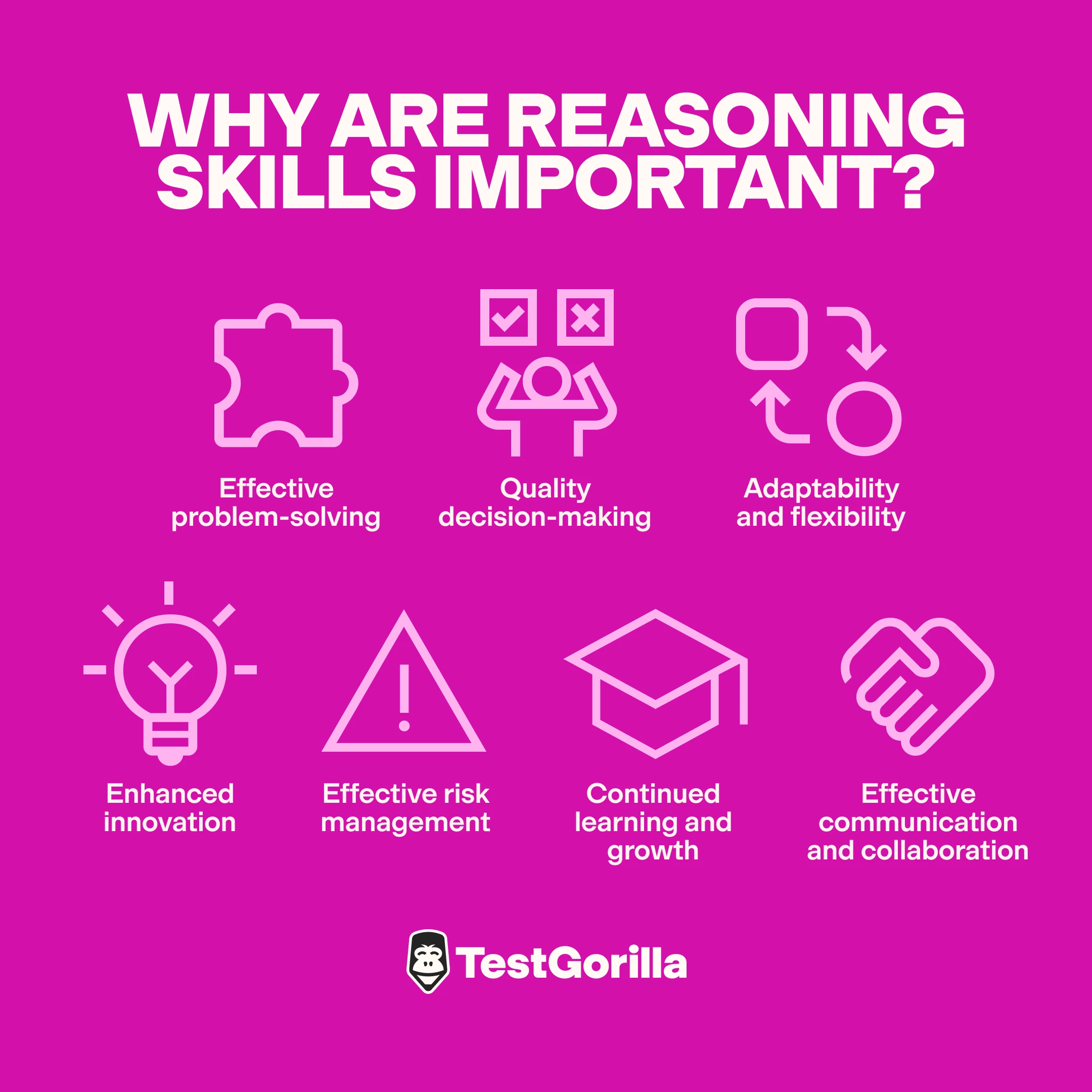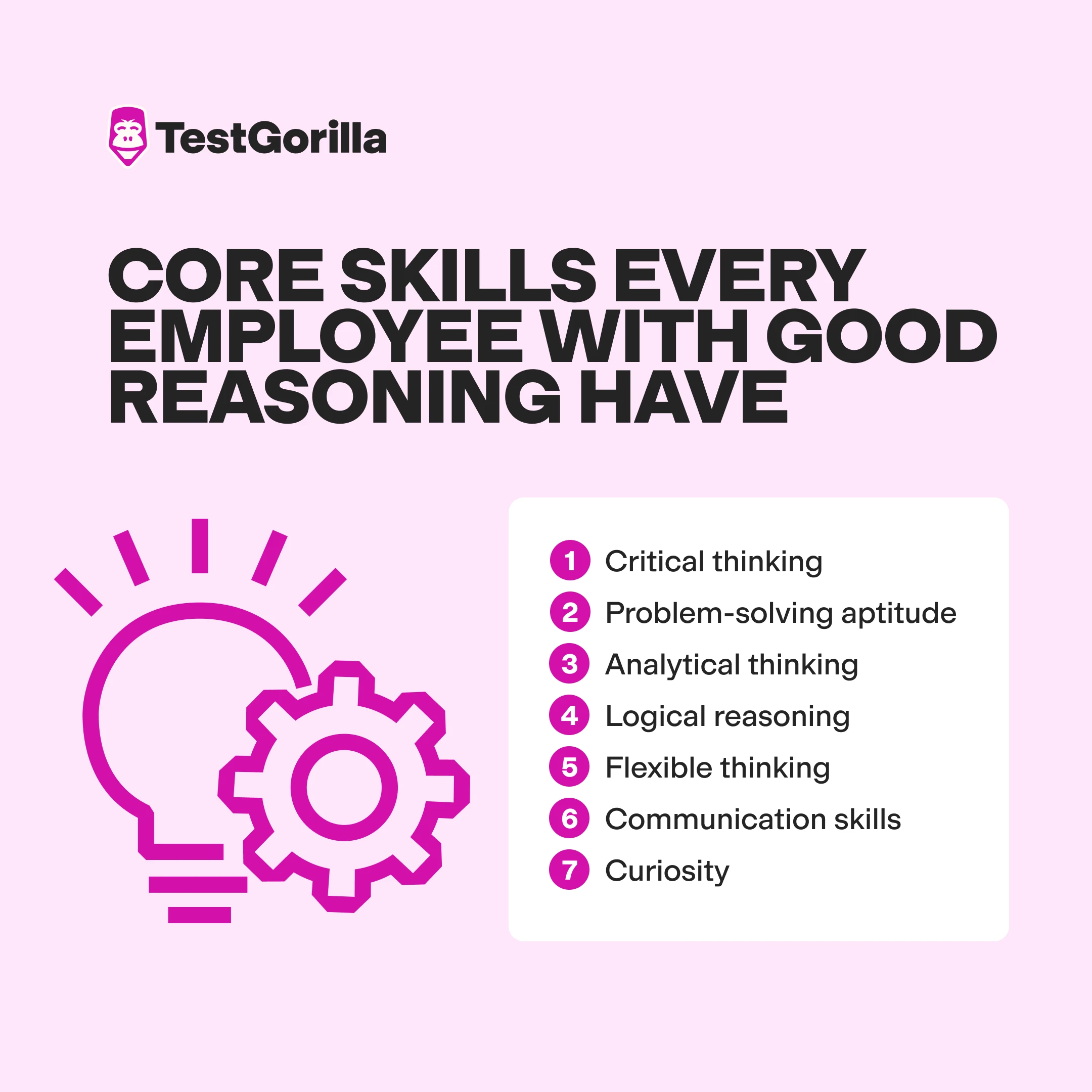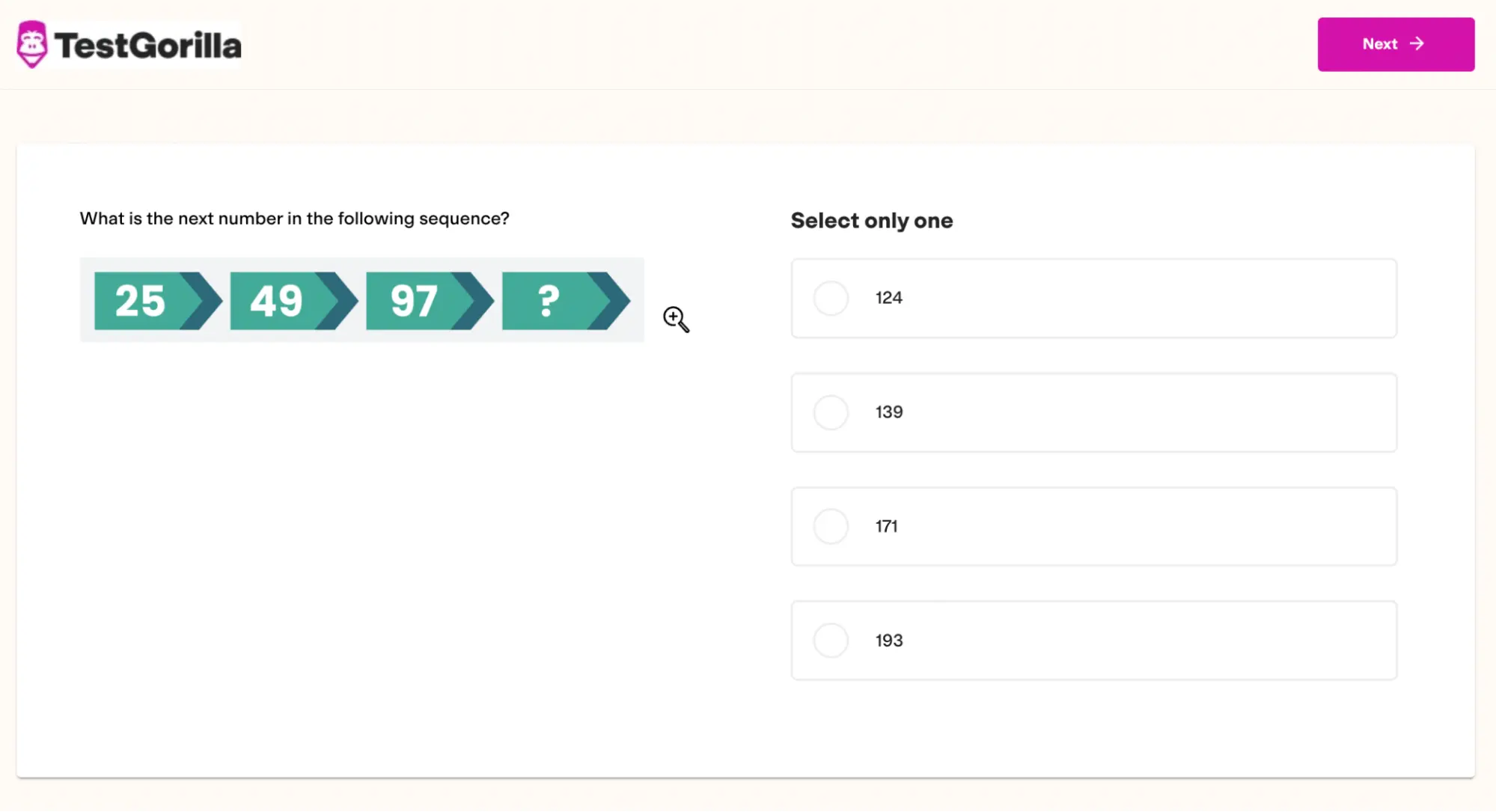7 key reasoning skills (and how to assess them)
Hire the best candidate every time with TestGorilla.
Identifying individuals with excellent reasoning skills is a common goal when making new hires to build a high-performance team. The ability of your employees to analyze information, think critically, and draw logical conclusions has never been more important than in today’s fast-moving and data-driven business landscape.
Pre-employment reasoning tests offer great value by effectively assessing these valuable cognitive skills:
Solving problems
Evaluating arguments
Drawing logical inferences without bias
Interpreting numbers, fractions, ratios, and percentages
By leveraging these assessments, you can secure candidates with the cognitive skills necessary for analytical thinking and decision-making.
Table of contents
Why are reasoning skills important?
Reasoning skills provide the following advantages:
Effective problem-solving
Colleagues with business reasoning skills can tackle complex problems with accuracy and efficiency. They can analyze information, identify patterns, and make logical connections, enabling them to devise smart ways to meet challenges.
Problem-solving abilities offer several advantages, including:
Enhanced productivity
Streamlined work processes
Continuous organizational improvement.
This is why you need analytic skills testing in your hiring process if you want to find the best candidates.
Quality decision-making
Applied reasoning skills contribute to effective decision-making. Employees who think critically and can logically evaluate information are more likely to make informed decisions based on evidence and careful analysis and synthesis.
They weigh options, consider potential outcomes, and anticipate risks to help mitigate errors.
Adaptability and flexibility
Individuals who think critically and analyze situations from different angles are better equipped to tackle new challenges, adjust their approach, and discover winning strategies.
Their reasoning ability fosters organizational resilience, enabling them to thrive in fast-paced industries and contribute to the team’s overall growth and success.
Enhanced innovation
Reasoning skills create the foundation for innovative thinking. Employees who excel in reasoning quickly identify gaps, find opportunities, and connect seemingly unrelated ideas or concepts.
Their ability to analyze data, draw conclusions without logical fallacies, and come up with creative new tactics drives innovation. Hiring colleagues with superb reasoning skills encourages the development of new groundbreaking ideas.
Use TestGorilla to hire the best
Starting with TestGorilla is fast and 100% free. All you need to do is sign up and start planning your cognitive assessments.
Effective risk management
Team members with excellent reasoning abilities can evaluate potential risks, weigh their impact, and consider mitigation strategies.
Their ability to anticipate challenges and make calculated decisions reduces the likelihood of costly errors or setbacks, contributing to effective risk management within your organization.
Continued learning and growth
Problem-solvers with great reasoning skills tend to be lifelong learners. They have a natural curiosity and the drive to expand their knowledge and skills.
Their ability to think critically and adapt enables them to embrace new strategies, learn from experiences, and grow professionally.
Effective communication and collaboration
Employees with critical reasoning skills can express their ideas clearly. They can engage in meaningful discussions, contribute valuable insights, and articulate their point of view.
They can also understand and respect diverse perspectives, leading to enhanced teamwork, collaboration, and the generation of new, exciting courses of action through collective intelligence.
What 7 skills and traits do employees with good reasoning have?
Colleagues with strong reasoning skills have these seven skills and traits in common:
Critical thinking
Problem-solving aptitude
Analytical thinking
Logical reasoning
Flexible thinking
Communication skills
Curiosity
1. Critical thinking
Individuals with solid reasoning skills demonstrate strong critical thinking abilities. They can analyze information objectively, evaluate arguments, and identify logical inconsistencies.
Their critical thinking skills enable them to approach abstract reasoning skills challenges with a logical and rational mindset, so they make sound decisions and solve complex issues effectively.
2. Problem-solving aptitude
Excellent reasoning skills often go hand in hand with exceptional problem-solving aptitude. Candidates who excel in reasoning can break down complex problems into manageable components, identify patterns, and come up with innovative new strategies.
They exhibit a natural curiosity, a willingness to explore different approaches, and the ability to think outside the box, enabling them to overcome obstacles and find creative resolutions.
3. Analytical thinking
A key trait of individuals with good reasoning skills is their ability to think analytically. They can dissect complex information, identify key components, and draw connections between various data points.
With their analytical reasoning ability, they can examine data objectively, discern trends or patterns, and make informed decisions based on evidence and logical deductions.
4. Logical reasoning
It can be tricky to define reasoning skills. Coworkers with strong logical reasoning skills can follow sequences, identify cause-and-effect relationships, solve word problems, create analogies, and draw conclusions based on deductive or inductive reasoning.
Their applied reasoning skills enable them to evaluate options, anticipate potential outcomes, and choose the most appropriate course of action.
5. Flexible thinking
Coworkers with good logical reasoning skills often exhibit cognitive flexibility. They can adapt their thinking and approach to different situations, incorporating new information and adjusting their perspectives as needed.
Their cognitive flexibility lets them consider multiple viewpoints, explore alternative options, and navigate complex challenges with an open mind.
6. Communication skills
For reasoning skills to be effective in the workplace, communication is key.
The ability to communicate effectively helps to convey the deductive reasoning process, engage in meaningful discussions, and collaborate with others, fostering better teamwork and understanding within the organization.
Employee seniority level | Required communication skills |
Individual contributor | Active listening, professional etiquette |
Team lead | Summarizing instructions, persuasion |
Mid-level manager | Interpreting feedback, conflict management |
Workplace communication tests can evaluate candidates’ ability to collaborate in fast-paced environments where the details matter.
If you are curious about best practices for employee assessments, our experts are here to offer you a free demo to discuss how our technology can best be deployed to streamline your organization’s hiring decisions.
7. Curiosity
Individuals with good reasoning skills demonstrate a natural curiosity and a thirst for continuous learning.
Their curiosity drives them to stay updated on industry trends, engage in self-improvement, and continuously develop their reasoning abilities.
How to evaluate business reasoning skills and traits: 7 assessments
When it comes to assessing a candidate’s business reasoning skills, it’s important to delve deeper beyond surface-level observations. Understanding their critical thinking, problem-solving, and decision-making abilities is crucial.
Our extensive test library is a treasure trove of options that measure all of the skills we just covered. You can mix and match tests to create an assessment that aligns perfectly with your company’s requirements, such as combining role-specific tests (like MySQL) with general logical reasoning tests.
Whether you’re searching for top-notch analysts or logical thinkers who thrive in challenging situations, our tests can help you discover exceptional candidates.
Here are some of our most popular logical skills tests for assessing reasoning skills:
TestGorilla assessment | Skills tested |
Verbal Reasoning test | Inference, judgment, interpretation |
Spatial Reasoning test | Visualization, manipulation, memory |
Numerical Reasoning test | Data analysis, pattern recognition, weighing arguments |
Problem Solving test | Data interpretation, scheduling, prioritization |
Attention to Detail (Textual) test | Data filtering, error detection, consistency |
Understanding Instructions test | Adherence to written and visual directions |
Critical Thinking test | Comparing arguments, recognizing assumptions, making inferences |
All of the tests mentioned in this table are available in our test library.
Let’s dive into these seven tests.
1. Critical Thinking test
We understand the significance of this skills assessment in evaluating a candidate’s ability to analyze information, make logical connections, and approach problems from multiple perspectives.
By incorporating the Critical Thinking test into your hiring funnel, you gain valuable insights into an individual’s cognitive abilities and capacity to think critically in real-world scenarios.
This test measures aptitude beyond simple memorization or rote learning. It assesses how candidates can apply their knowledge, reason through complex situations, and arrive at sound conclusions.
2. Verbal Reasoning test
Our Verbal Reasoning test is essential because it assesses language comprehension, critical reasoning skills, and problem-solving abilities. It evaluates an individual’s capacity to understand written information and draw logical conclusions.
You can build a team of thoughtful professionals with an excellent capacity for collaboration by using this test.
3. Spatial Reasoning test
Our Spatial Reasoning test assesses a candidate’s capacity to perceive and understand spatial relationships, shapes, and patterns.
This skill is particularly relevant in fields such as engineering, architecture, design, and logistics, where professionals often encounter complex spatial problems.
The Spatial Reasoning test also assesses a candidate’s capacity to visualize and manipulate objects in space. These abilities are essential for tasks that involve spatial planning, such as interpreting maps, organizing physical spaces, or understanding 3D models.
Candidates who perform well in spatial reasoning tests demonstrate a heightened ability to think ahead, anticipate outcomes, and develop effective strategies based on spatial information.
Build a bright team with TestGorilla
The leading companies use TestGorilla to hire quantifiably better talent. Our experts are happy to show you how it’s done.
4. Numerical Reasoning test
The Numerical Reasoning test provides valuable insights into a job candidate’s grasp of numbers, particularly in terms of quantitative reasoning skills, problem-solving, and logical thinking.
By assessing a candidate’s quantitative reasoning skills, this test assists you in identifying those who possess the numerical acumen necessary for roles involving financial analysis, data-driven decision-making, and problem-solving using quantitative methods.
5. Problem Solving test
Problem-solving tests evaluate a candidate’s aptitude for analyzing issues from different perspectives, breaking them down into manageable components, and applying logical reasoning to reach effective resolutions.
The Problem Solving test measures a candidate’s ability to think critically, make sound judgments, and adapt their problem-solving approach as necessary.
Strong problem-solving skills are a solid predictor of workplace performance and employee retention. If you’re ready to give your hiring a leg-up over the competition, get started today by signing up for our Free forever plan to hire for problem-solving skills and more.
6. Attention to Detail (Textual) test
Our Attention to Detail (Textual) test offers valuable insights into a job candidate’s reasoning skills, particularly in assessing their ability to analyze and comprehend written information with precision and accuracy.
In most professional settings, the ability to pay close attention to detail is paramount. The Attention to Detail (Textual) test assesses a candidate’s proficiency in reading, comprehending, and scrutinizing written information, ensuring accuracy and completeness.
7. Understanding Instructions test
The Understanding Instructions test plays a useful role in evaluating a job candidate’s reasoning skills, specifically their ability to understand and accurately execute tasks based on given instructions.
This test focuses on assessing an individual’s attention to detail, critical thinking, and capacity to analyze and interpret instructions.
It offers valuable insights into a candidate’s logical reasoning, problem-solving skills, and potential for success in roles that require close adherence to guidelines.
You are what you measure, so start building smarter teams by incorporating skills-based testing into your hiring funnel.
How to improve reasoning skills
To improve your own reasoning skills or to build a culture of constant improvement at your organization, there are a few techniques for consistent upskilling.
To improve your reasoning skills, try out the following:
Be intentional about upskilling: To improve your reasoning skills or any vital workplace skill, you want to be consistent and intentional. Measure where you’re at currently, and then prioritize on-the-job training opportunities. Read our upskilling best practices guide for a ready-made strategy.
Focus on communication: A common thread of reasoning skills that are vital in the workplace is that they are focused on communication. Communication is a skill, and like any skill, workplace communication can be trained.
Build on success: Be sure to take a moment to celebrate your wins on your pathway to improving your reasoning skills. Little incentives can go a long way in helping you stick with your plan to grow professionally.
With the right upskilling strategy, you can enjoy the benefits of being a member of smarter teams and an innovative workplace.
TestGorilla can help you find candidates with reasoning skills
By incorporating TestGorilla’s assessments into your hiring process, you can focus on candidates with an advanced capacity to analyze, strategize, and make informed decisions, setting the stage for building a team of exceptional talent.
If you’re looking to measure reasoning skills and reduce hiring bias with skills-based testing, let us help. With our extensive range of scientifically designed tests, we provide you with a powerful tool to assess and evaluate critical thinking and problem-solving abilities.
Sign up for a free 30-minute live demo and check out our product tour to see how TestGorilla helps you hire smarter.
If you prefer to explore at your own pace, sign up for a Free forever plan today.
Reasoning skills FAQs
Looking for answers to the most common questions about reasoning skills? Check out the ones below:
What is a reasoning skills assessment?
A reasoning skills assessment is a valuable tool that can provide insights into a candidate’s ability to analyze information, think critically, and make logical deductions. This assessment aims to evaluate an individual’s cognitive skills related to problem-solving, decision-making, and analytical thought processes.
There are several types of cognitive ability tests that can aid in assessing reasoning. During reasoning tests, candidates are presented with various scenarios, questions, or problems that require them to apply logical thinking and problem-solving techniques.
What are examples of reasoning?
Reasoning comes in several forms, so there is no one-size-fits-all test to measure general reasoning skills. Examples of reasoning include:
Verbal reasoning: Interpret detailed instructions and ask logical follow-up questions for clarification needed to start your project
Numerical reasoning: Analyze complex datasets, pulling out valuable patterns in the data and identifying areas where the data has blindspots
Spatial reasoning: Quickly read maps or blueprints, accurately associating physical locations with their on-paper equivalents
What are the 3 most common types of reasoning?
There are several types of reasoning skills to test for in your new hires. The 3 most common types of reasoning skills include:
Verbal reasoning: Quickly and accurately interpreting language and making logical inferences based on verbal communication
Numerical reasoning: Interpreting numerical data and making logical deductions to predict future performance
Spatial reasoning: Perceiving and understanding patterns, shapes, and spatial relationships
Related posts
Hire the best candidates with TestGorilla
Create pre-employment assessments in minutes to screen candidates, save time, and hire the best talent.
Latest posts
The best advice in pre-employment testing, in your inbox.
No spam. Unsubscribe at any time.

Hire the best. No bias. No stress.
Our screening tests identify the best candidates and make your hiring decisions faster, easier, and bias-free.
Free resources
This checklist covers key features you should look for when choosing a skills testing platform
This resource will help you develop an onboarding checklist for new hires.
How to assess your candidates' attention to detail.
Learn how to get human resources certified through HRCI or SHRM.
Learn how you can improve the level of talent at your company.
Learn how CapitalT reduced hiring bias with online skills assessments.
Learn how to make the resume process more efficient and more effective.
Improve your hiring strategy with these 7 critical recruitment metrics.
Learn how Sukhi decreased time spent reviewing resumes by 83%!
Hire more efficiently with these hacks that 99% of recruiters aren't using.
Make a business case for diversity and inclusion initiatives with this data.


























